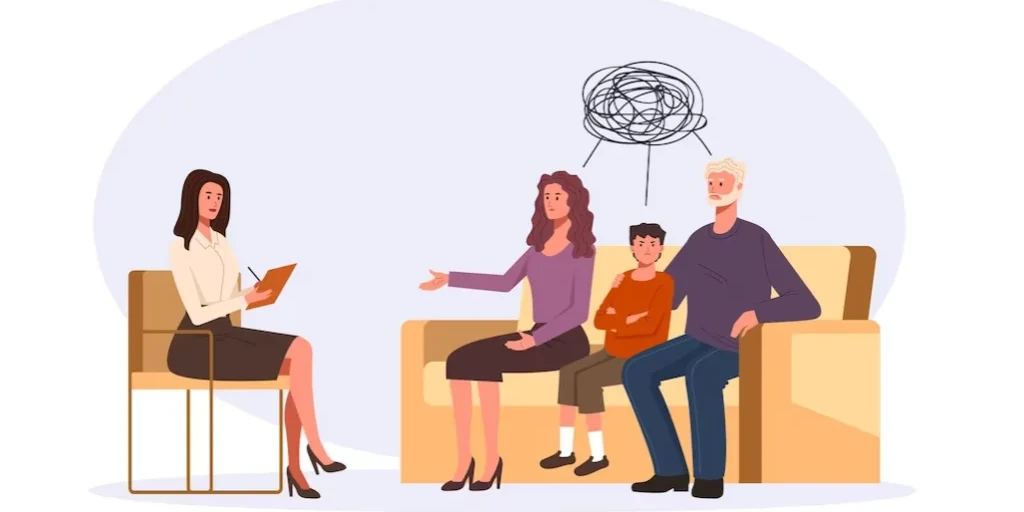24/7 Helpline:
(866) 899-221924/7 Helpline:
(866) 899-2219
Learn more about PTSD Treatment centers in Crofton
PTSD Treatment in Other Cities

Other Insurance Options

Ambetter

Lucent

Highmark

ComPsych

Absolute Total Care

Medical Mutual of Ohio

Sutter

Premera

EmblemHealth

Self-pay options

Magellan

MVP Healthcare

Providence

Regence

Multiplan

Humana

Evernorth

State Farm

UMR

American Behavioral







Chance Center
Chance Center is a private rehab located in Baltimore, Maryland. Chance Center specializes in the tr...

Right Turn of Maryland
Right Turn of Maryland is a CARF-accredited substance abuse treatment center in Eldersburg, MD. Root...

Tuerk House
Situated in Baltimore, Maryland, Tuerk House is a drug and alcohol rehab for adults with substance u...

House of Change
House of Change is a private rehab located in Baltimore, Maryland. House of Change specializes in th...

Treatment Resources for Youth
Treatment Resource for Youth is a non-profit, adolescent centered substance abuse facility with nume...

By Grace – Counseling
By Grace – Counseling is a private rehab located in Baltimore, Maryland. By Grace – Counseling speci...

Maryland House Detox
Maryland House Detox offers inpatient services for those individuals in need of detoxification. Mary...

Helping Up Mission
Helping Up Mission, located in Baltimore, Maryland, offers a wide variety of mental health support, ...

John Hopkins Broadway Center for Addiction
Located in Baltimore, Maryland, John Hopkins Broadway Center provides alcohol and drug rehab service...

Recovery Network – 25th Street
Recovery Network on 25th Street is a subsidiary of the University Psychological Center in Baltimore,...

The Baltimore Station
The Baltimore Station is an innovative therapeutic residential treatment program supporting veterans...

Harbel Prevention and Recovery Center – Adult Clinic
Harbel Prevention and Recovery Center, situated in Baltimore, Maryland, is an addiction treatment ce...

Foundations Psychiatric Rehabilitation
Foundations Psychiatric Rehabilitation is a private rehab located in Linthicum Heights, Maryland. Fo...

EJAL Health Services
EJAL Health Services is a private traditional rehab located in Glen Burnie, Maryland. EJAL Health Se...

Baltimore Crisis Response
Baltimore Crisis Response is a private rehab located in Baltimore, Maryland. Baltimore Crisis Respon...

Martha’s Place
Martha’s Place, located in Baltimore, Maryland, is a gender-specific treatment center offering alcoh...

Pine Heights Treatment Center
Pine Heights Treatment Center offers outpatient treatment for individuals with opiate addiction. The...

Glenwood Life Counseling Center
Glenwood Life Counseling Center is a private rehab located in Baltimore, Maryland. Glenwood Life Cou...

DeVaughn Intervention Teach & Treat Options – DITTO
DeVaughn Intervention Teach & Treat Options – DITTO is a non-profit rehab located in Baltimore, Mary...

Reflective Treatment Center
Reflective Treatment Center is a private rehab located in Baltimore, Maryland. Reflective Treatment ...

John Hopkins – Children’s Mental Health Center
John Hopkins - Children’s Mental Health Center, located in Baltimore, Maryland, provides a wide vari...

Baltimore Recovery Center
Baltimore Recovery Center is a private rehab located in Baltimore, Maryland. Baltimore Recovery Cent...

JR Healthcare – Behavioral Health
JR Healthcare – Behavioral Health is a private rehab located in Baltimore, Maryland. JR Healthcare –...

People Encouraging People
People Encouraging People, located in Baltimore, Maryland, provided alcohol and drug rehab programmi...

Institutes for Behavior Resources – Outpatient
Institutes for Behavior Resources – Outpatient is a private rehab located in Baltimore, Maryland. In...

Gaudenzia – Park Heights
Gaudenzia Park Heights offers adults struggling with substance abuse and dual diagnosis mental healt...

New Vision House of Hope
New Vision House of Hope is a non-profit located in Baltimore City. New Vision House of Hope special...

Ferry Point Treatment Center
Ferry Point Treatment Center is a private traditional rehab located in Odenton, MD. Ferry Point Trea...

Bon Secours – ADAPT Cares
Bon Secours - ADAPT Cares is a substance abuse treatment program providing community-based outpatien...

Family Health Centers of Baltimore – Community Recovery
Family Health Centers of Baltimore – Community Recovery is a public rehab located in Baltimore, Mary...

ADI – Alcohol and Drug Intervention
ADI – Alcohol and Drug Intervention is a private rehab located in Glen Burnie, Maryland. ADI – Alcoh...

Northern Parkway Treatment Services
Northern Parkway Treatment Services is a private rehab located in Baltimore, MD. Northern Parkway Tr...

Baltimore Behavioral Health
Baltimore Behavioral Health is a private rehab located in Baltimore, Maryland. Baltimore Behavioral ...

Apex Counseling Center
Apex Counseling Center is a private rehab located in Baltimore, Maryland. Apex Counseling Center spe...

A Step Forward
Located in Baltimore, Maryland, A Step Forward provides alcohol and drug rehab services, along with ...

Omni House – Mental Health
Omni House – Mental Health is a private rehab located in Glen Burnie, Maryland. Omni House – Mental ...

Man Alive Lane Treatment Center
Man Alive Lane Treatment Center is a private rehab located in Baltimore, Maryland. Man Alive Lane Tr...

Building Communities Today for Tomorrow
Building Communities Today for Tomorrow is a private rehab located in Baltimore, Maryland. Building ...

CAM Center for Addiction Medicine
CAM Center for Addiction Medicine is a drug and alcohol rehab located in Baltimore, Maryland. They p...

Mountain Manor Treatment Centers
Mountain Manor Treatment Center is an all inclusive rehab that offers substance abuse services in Ma...

Gaudenzia – Woodland
Gaudenzia is an accredited dual diagnosis substance use disorder drug rehab facility in Baltimore, M...

MedMark Treatment Centers – North Calvert Street
MedMark Treatment Centers - North Calvert Street offers outpatient treatment for individuals with an...

Health Care for the Homeless – Downtown
Health Care for the Homeless - Downtown is located in Baltimore, Maryland. Health Care for the Homel...

Health Care for the Homeless – West Baltimore
Health Care for the Homeless - West Baltimore is located in Baltimore, Maryland. Health Care for the...

Health Care for the Homeless – Baltimore County
Health Care for the Homeless - Baltimore County is located in Baltimore, Maryland. Health Care for t...

Volunteers of America Chesapeake’s Residential ReEntry Center
Volunteers of America Chesapeake’s Residential ReEntry Center is a non-profit rehab located in Balti...

Regain Hope
Regain Hope is a public rehab located in Baltimore, Maryland. Regain Hope specializes in the treatme...

Healthy Lives
Healthy Lives is a private rehab located in Baltimore, Maryland. Healthy Lives specializes in the tr...

Hope’s Horizon
Located in Perry Hall, Maryland, Hope’s Horizon is an alcohol and drug rehab organization. They offe...

MedMark Treatment Centers Cherry Hill
MedMark Treatment Centers Cherry Hill is a private rehab located in Baltimore, Maryland. MedMark Tre...

Balance Point Wellness – Baltimore
Balance Point Wellness, LLC is a community based holistic mental health and wellness center that pro...

Sheppard Pratt Integrated Behavioral Health at GBMC – Perry Hall
Sheppard Pratt Integrated Behavioral Health at GBMC – Perry Hall is a private rehab located in Balti...

Recovery Center Of USA
Recovery Center Of USA is a rehab facility located in Baltimore, MD. Recovery Center Of USA speciali...

Sandstone Care Teen Center at Chesapeake
Sandstone Care Chesapeake is a residential treatment center designed specifically for teens (ages 13...

Riverside Treatment Services LLC Lansdowne
Riverside Treatment Services LLC Lansdowne is a private rehab located in Baltimore, Maryland. Rivers...

Misha House Baltimore
Misha House Baltimore is a non-profit rehab located in Baltimore, Maryland. Misha House Baltimore sp...

B.N.J. Health Services
B.N.J. Health Services is a private rehab located in Baltimore, Maryland. B.N.J. Health Services spe...

Safe House
Safe House is a private rehab located in Baltimore, MD. Safe House have an inpatient, medically assi...

Focus on Recovery
Focus on Recovery is a private rehab located in Baltimore, MD. Focus on Recovery specializes in the ...

Addiction Treatment Services
Addiction Treatment Services is a private rehab located in Baltimore, Maryland. Addiction Treatment ...

Huber and Associates Counseling
Huber and Associates Counseling is a private rehab located in Baltimore, Maryland. Huber and Associa...

Belair Road Health Solutions
Belair Road Health Solutions is a private rehab located in Baltimore, Maryland. Belair Road Health S...

Empowering Minds Resource Center
Empowering Minds Resource Center provides direct mental health, substance abuse and community suppor...

The Baltimore Station – Baker Street
The Baltimore Station - Baker Street is an innovative therapeutic residential treatment program supp...

Marian House
Marian House is a transitional housing and rehabilitation program that provides support services suc...

REK Advanced Therapeutic Solutions
REK Advanced Therapeutic Solutions its an Intensive Outpatient and Outpatient facility that offers t...

Penn North Recovery
Penn North Recovery is a drug and alcohol treatment center based in Baltimore, MD. Their comprehensi...

Total Healthcare – Substance Abuse Services
Total Healthcare – Substance Abuse Services is a private rehab located in Baltimore, Maryland. Total...

Key Point Health Services – Outpatient
Key Point Health Services – Outpatient is a private rehab located in Baltimore, Maryland. Key Point ...

Baltimore City Counseling Center – South Frederick Street
Baltimore City Counseling Center - South Frederick Street is located in Baltimore, Maryland. Baltimo...

Recovery Network – Intensive Outpatient
Recovery Network – Intensive Outpatient is a private rehab located in Baltimore, Maryland. Recovery ...

Echo House Multi Service Center
Echo House Multi Service Center is a private rehab located in Baltimore, Maryland. Echo House Multi ...

Vesta
Vesta is a private, non-profit behavioral healthcare located in Odenton, Maryland. Vesta offers inpa...

Chrysalis House
Chrysalis House is a private rehab located in Crownsville, MD. Chrysalis House specializes in the tr...

Baltimore City Counseling Center – Belair Road
Baltimore City Counseling Center - Belair Road is located in Baltimore, Maryland. Baltimore City Cou...

Essential Behavioral Health Services
Essential Behavioral Health Services is a fully licensed Psychiatric Rehabilitation Program ( PRP ) ...

I’m Still Standing by Grace
I'm Still Standing by Grace has been helping people to overcome their substance abuse for many years...

EPOCH Counseling Center – Dundalk Center
EPOCH Counseling Center – Dundalk Center is a private rehab located in Baltimore, Maryland. EPOCH Co...

Union Memorial Hospital – Behavioral Health
Union Memorial Hospital – Behavioral Health is a private rehab located in Baltimore, Maryland. Union...

Metro Family Therapeutic Services
Metro Family Therapeutic Services is a private rehab located in Baltimore, Maryland. Metro Family Th...

Turning Point Clinic
Turning Point Clinic is a private rehab located in Baltimore, Maryland. Turning Point Clinic special...

Step By Step of Maryland
Located in Baltimore, Maryland, Step by Step offers alcohol and drug rehab services to men and women...

Standing Strong
Standing Strong is a private rehab located in Baltimore, Maryland. Standing Strong specializes in th...

Dayspring Village
Dayspring Village is a non-profit rehab located in Baltimore, MD. Dayspring Village specializes in t...

Gaudenzia – Outpatient
Gaudenzia - Outpatient addresses the needs of chemically dependent adults and provides specialized p...

Hope House
Hope House is a dual diagnosis addiction treatment center in Crownsville, MD for individuals and fam...






























































































































































































































































































































































































Phoenix House – Counseling Center
Phoenix House - Counseling Center is located in Glen Burnie, Maryland. Phoenix House - Counseling Ce...

Salvation Army – Adult Rehabilitation Center
Salvation Army – Adult Rehabilitation Center is a non-profit rehab located in Baltimore, Maryland. S...

Operation Recovery Center
Operation Recovery Center is a private rehab located in Baltimore, Maryland. Operation Recovery Cent...

BNJ Health Services
BNJ Health Services is a private rehab located in Baltimore, Maryland. BNJ Health Services specializ...

I Can’t We Can Recovery
I Can’t We Can Recovery is a private rehab located in Baltimore, Maryland. I Can’t We Can Recovery s...

Learn to Live Foundation
Learn to Live Foundation is a private rehab located in Baltimore, Maryland. Learn to Live Foundation...

Recovery Network – Charles Street
Recovery Network - Charles Street provides a unique opportunity for integrated treatment for those w...

Treatment Resources for Youth – Charles Street
Treatment Resource for Youth - Charles Street is a non-profit, adolescent centered substance abuse f...

Behavioral Pharmacology Research Unit – BPRU
Behavioral Pharmacology Research Unit (BPRU) is a private rehab located in Baltimore, MD. Behavioral...

Wholistic Counseling
Wholistic Counseling is a private rehab located in Baltimore, Maryland. Wholistic Counseling special...

We Care Arundel Health Services
We Care Arundel Health Services is a private rehab located in Glen Burnie, Maryland. We Care Arundel...

Transitioning Lives
Transitioning Lives is a private rehab located in Baltimore, Maryland. Transitioning Lives specializ...

Towson Addictions Center
Towson Addictions Center specializes in the treatment of substance abuse related problems. Their ser...

Johns Hopkins Broadway Center for Addiction – Wilson House
Johns Hopkins Broadway Center for Addiction - Wilson House is a private rehab located in Baltimore, ...

Fayette House
Fayette House is a private rehab located in Baltimore, Maryland. Fayette House specializes in the tr...

Light of Truth Center
Light of Truth Center is a private rehab located in Baltimore, Maryland. Light of Truth Center speci...

Chance II Change
Chance II Change is a private rehab located in Baltimore, Maryland. Chance II Change specializes in ...

Carrington House
Carrington House is a private rehab located in Baltimore, Maryland. Carrington House specializes in ...

Mountain Manor Outpatient Services – Eastern Avenue
Mountain Manor Outpatient Services - Eastern Avenue is located in Baltimore, Maryland. Mountain Mano...

All Addictions Treatment Center
All Addictions Treatment Center is a private rehab located in Baltimore, Maryland. All Addictions Tr...

Youth Reaching Out
Youth Reaching Out is a substance abuse and mental health counseling dedicated to provide services f...

Change Health Systems – Baltimore
Change Health Systems is a community-based wellness center that provides psychiatric recovery, rehab...

Universal Counseling Services – West Read Street
Universal Counseling Services – West Read Street is a private rehab located in Baltimore, Maryland. ...

I Cant We Can Counseling Center
I Cant We Can Counseling Center is a private rehab located in Baltimore, Maryland. I Cant We Can Cou...

Loyola College Alcohol and Drug Support Services
Loyola College Alcohol and Drug Support Services offers outpatient services for students dealing wit...

No Turning Back
No Turning Back is a private rehab located in Baltimore, Maryland. No Turning Back specializes in th...

I Can’t We Can – Halfway House
I Can’t We Can – Halfway House is a private rehab located in Baltimore, Maryland. I Can’t We Can – H...

Baltimore Prevention Coalition
Baltimore Prevention Coalition is a private rehab located in Baltimore, Maryland. Baltimore Preventi...

Jones Falls Community Outreach
Jones Falls Community Outreach is a private rehab located in Baltimore, Maryland. Jones Falls Commun...

People Encouraging People
People Encouraging People is a private rehab located in Glen Burnie, Maryland. People Encouraging Pe...

Awele Treatment and Rehab Services
Awele Treatment and Rehab Services is a private rehab located in Baltimore, Maryland. Awele Treatmen...

Integrative Counseling
Integrative Counseling is a private rehab located in Glen Burnie, Maryland. Integrative Counseling s...

Hunter Behavorial Health Care Services
Hunter Behavorial Health Care Services is a private rehab located in Baltimore, Maryland. Hunter Beh...

Alcohol and Drug Abuse Program
Alcohol and Drug Abuse Program is a private rehab located in Baltimore, Maryland. Alcohol and Drug A...

Friendship House
Friendship House is a private rehab located in Baltimore, Maryland. Friendship House specializes in ...

Bridge House
Bridge House offers inpatient and outpatient treatment for individuals with alcohol and/or substance...

MedMark Treatment Centers – Giles Road
MedMark Treatment Centers - Giles Road offers outpatient treatment for individuals with an opiate ad...

Turning Corners
Turning Corners is a private rehab located in Baltimore, Maryland. Turning Corners specializes in th...

Recovery in Community
Recovery in Community is a private rehab located in Baltimore, Maryland. Recovery in Community speci...

Friend and Family House
Friend and Family House is a private rehab located in Baltimore, Maryland. Friend and Family House s...

Club 857
Club 857 is a private rehab located in Baltimore, Maryland. Club 857 specializes in the treatment of...

All Walks of Life
All Walks of Life is a private rehab located in Baltimore, Maryland. All Walks of Life specializes i...

Comprehensive Treatment Center
Comprehensive Treatment Center is a private rehab located in Millersville, Maryland. Comprehensive T...

Robert A. Pascal Youth & Family Services
Robert A. Pascal Youth & Family Services is a private rehab located in Severna Park, Maryland. Rober...

New Vision Behavioral Health Service
New Vision Behavioral Health Service is a private rehab located in Baltimore, Maryland. New Vision B...

Clean Slate Recovery
Clean Slate Recovery is a private rehab located in Baltimore, Maryland. Clean Slate Recovery special...

Quarter Way Houses
Quarter Way Houses is a private rehab located in Baltimore, Maryland. Quarter Way Houses specializes...

New Vision Behavioral Health Services
New Vision Behavioral Health Services is a private rehab located in Baltimore, Maryland. New Vision ...

Recovery Network Halfway Houses Program
Recovery Network Halfway Houses Program is a private rehab located in Baltimore, Maryland. Recovery ...

House of Hope – Tova House
House of Hope – Tova House is a private rehab located in Baltimore, Maryland. House of Hope – Tova H...

AA – Alcoholics Anonymous
AA – Alcoholics Anonymous is a non-profit rehab located in Baltimore, Maryland. AA – Alcoholics Anon...

Anne Arundel Counseling
Anne Arundel Counseling is a private rehab located in Glen Burnie, MD. Anne Arundel Counseling speci...

People’s Community Health Center
People’s Community Health Center is a private rehab located in Baltimore, Maryland. People’s Communi...

DWI Long Term Residential Facility
DWI Long Term Residential Facility is a private rehab located in Baltimore, Maryland. DWI Long Term ...

MedMark Treatment Centers – Baltimore 101
MedMark Treatment Centers - North Eutaw Street offers outpatient treatment for individuals with an o...

Druid Heights Treatment and Counseling Center
Druid Heights Treatment and Counseling Center is a private rehab located in Baltimore, Maryland. Dru...

Universal Counseling Services
Universal Counseling Services is a private rehab located in Baltimore, Maryland. Universal Counselin...

Partners in Recovery
Partners in Recovery serves adults with substance use issues who are committed to seeking positive a...

I Can – Oasis
I Can – Oasis is a private rehab located in Baltimore, Maryland. I Can – Oasis specializes in the tr...

Riker McKenzie Holistic Treatment Center
Riker McKenzie Holistic Treatment Center is a private rehab located in Baltimore, Maryland. Riker Mc...

Glass Health Programs
Glass Health Programs is a private rehab located in Baltimore, Maryland. Glass Health Programs speci...

National Institute on Drug Abuse – Archway
National Institute on Drug Abuse - Archway is a research facility in Baltimore, Maryland. National I...

Bon Secours – Behavioral Health
Bon Secours - Behavioral Health offers outpatient, intensive outpatient, and partial hospitalization...

Collington Square – Substance Abuse Counseling
Collington Square - Substance Abuse Counseling is a non-profit counseling clinic located in Baltimor...

Serenity Acres
Serenity Acres is an exclusive luxury residential treatment center for individuals struggling with c...

Powell Recovery Center
Powell Recovery Center in Baltimore, Maryland, is a full service alcohol and drug rehab facility. Th...

House of Hope
House of Hope is a private rehab located in Baltimore, Maryland. House of Hope specializes in the tr...

Build Fellowship
Build Fellowship is a private rehab located in Baltimore, Maryland. Build Fellowship specializes in ...

Hebron House
Hebron House is a private rehab located in Baltimore, Maryland. Hebron House specializes in the trea...

Urban Behavioral Associates
Urban Behavioral Associates is a private rehab located in Baltimore, Maryland. Urban Behavioral Asso...

Bridging the Gap Services
Bridging the Gap Services is a private rehab located in Baltimore, Maryland. Bridging the Gap Servic...

Boundless Innovations for Holistic Living
Boundless Innovations for Holistic Living is a private rehab located in Baltimore, Maryland. Boundle...

Johns Hopkins – Wilson Faith Houses
Johns Hopkins – Wilson Faith Houses is a private rehab located in Baltimore, Maryland. Johns Hopkins...

Loch Raven Mental Health Satellite Clinic at McVets
Loch Raven Mental Health Satellite Clinic at McVets is located in Baltimore, Maryland. Loch Raven Me...

Bon Secours – ACT and New Phases
Bon Secours - ACT/New Phases provides mental health and case management, as well as outreach service...

Serenity Acres – Stephens Wood Drive
Serenity Acres - Stephens Wood Drive is exclusive luxury residential treatment center for individual...

Serenity Acres – 2009 St. Stephens Wood Drive
Serenity Acres - 2009 St. Stephens Wood Drive is exclusive luxury residential treatment center for i...

Serenity Acres – 2017 Martins Grant Court
Serenity Acres - 2017 Martins Grant Court is exclusive luxury residential treatment center for indiv...

Serenity Acres – 2021 Martins Grant Court
Serenity Acres - 2021 Martins Grant Court is exclusive luxury residential treatment center for indiv...

Changing Turn – York Road
Changing Turn - York Road offers mental health outpatient services to teens, young adults and adults...

Changing Turn – Fredwall Avenue
Changing Turn - Fredwall Avenue offers mental health outpatient services to teens, young adults and ...

Foundations Recovery Center
Foundations Recovery Center offers a Partial Hospitalization Program, an Intensive Outpatient Progra...

Mi Casa es su Casa Behavioral Health Program
Mi Casa es su Casa Behavioral Health Program is a private rehab located in Baltimore, Maryland. Mi C...

Bright Futures Ahead
Bright Futures Ahead is a private rehab located in Baltimore, Maryland. Bright Futures Ahead special...

Bicycle Health – Maryland
Bicycle Health - Maryland is an online Medication Assisted Treatment Program. Bicycle Health - Maryl...

DiscoveryMD – White Marsh
DiscoveryMD of White Marsh, Maryland, offers treatment options for depression, anxiety and other out...

Therapeutic Solutions
Therapeutic Solutions is a private rehab located in Baltimore, Maryland. Therapeutic Solutions speci...

Brittneys Heart
Brittneys Heart is a private rehab located in Baltimore, Maryland. Brittneys Heart specializes in th...

Pressley Ridge – Outpatient
Pressley Ridge – Outpatient is a private rehab located in Baltimore, Maryland. Pressley Ridge – Outp...

Center for Addiction at John Hopkins
Center for Addiction at Johns Hopkins is a drug and alcohol rehab and medical facility in Baltimore,...

No Turning Back – Behavioral Health
No Turning Back – Behavioral Health is a private rehab located in Baltimore, Maryland. No Turning Ba...

Delta Rehabilitation Center
Delta Rehabilitation Center is a private rehab located in Baltimore, Maryland. Delta Rehabilitation ...

Allcare Treatment Services
Allcare Treatment Services is a private rehab located in Glen Burnie, Maryland. Allcare Treatment Se...

Gaudenzia
Gaudenzia is located in Crownsville, Maryland. Gaudenzia offers a continuum of care to adults dealin...

Kolmac Outpatient Recovery Centers
Kolmac Outpatient Recovery Centers provide outpatient detoxification, rehabilitation, and continuing...





















































































































































































